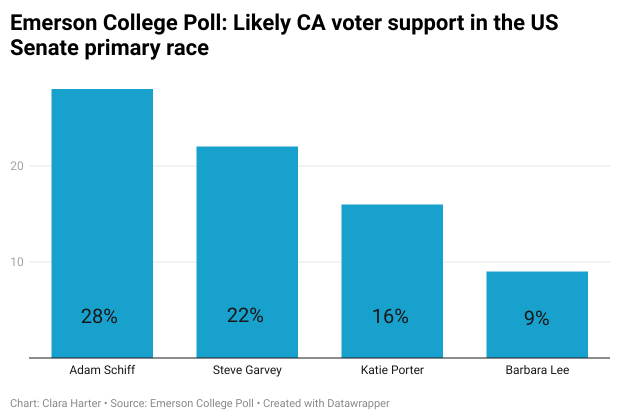Rep. Adam Schiff (D-Burbank) remains the frontrunner in California’s U.S. Senate race, but it’s unclear if Republican candidate and ex-Dodger Steve Garvey holds the lead over Rep. Katie Porter (D-Irvine) or if the two are deadlocked for second.
Two polls released this week offer different answers, serving as a good reminder that one: this is a very competitive race; and two: polls are an imperfect measure of voter preference.
A Public Policy Institute of California poll showed a virtual tie with Porter holding 19% of likely voter’s support and Garvey holding 18%, while an Emerson College Poll showed Garvey ahead of Porter with 22% of likely voters’ support compared to 16%.
Both polls had Schiff leading the race with around a quarter of likely voters’ support and Rep. Barbara Lee (D-Oakland) trailing in fourth with 10% or less of the vote. The remaining 23 candidates each captured 4% or less of the vote.

The top two vote-getters on March 5 will proceed to a November runoff. Schiff, for his part, stands to benefit from facing off against Garvey in deep blue California, where a Republican has not been elected to the Senate since 1988. A Schiff vs. Porter showdown could mean more competition, more party infighting and more campaign spending.
The two polls were conducted in close succession with a similar number of respondents.
The PPIC Poll took place from Feb. 6 to 13 using 1,075 likely voters, while the Emerson poll took place from Feb. 16 to 18 using 935 likely voters. Neither captured voters’ response to the final Senate debate.
So how should voters make sense of these seemingly contradictory results?
There are three key things to keep in mind says Cal State Long Beach assistant professor of Political Science Matt Lesenyie — the margin of error, the calculation of likely voters and the limited number of votes between second and third place.
Polling is not a precise science and every result comes with a margin for error. PPIC reported…
Read the full article here







